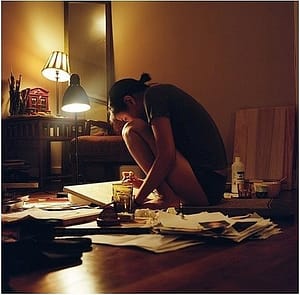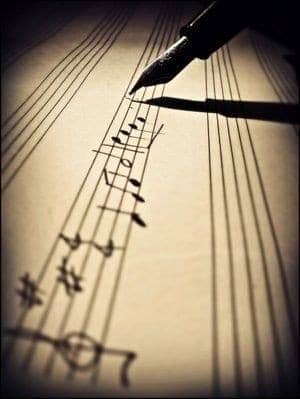There’s half-heard sound, coming out of the backstage hallway. It raises Drin’s hackles and sends adrenalin shrilling through his bloodstream, a vocalization of pain and fright that brings him to his feet before his conscious mind even understands what it is that he heard. He drops the accordion file of records and he’s moving fast and silent when he hears a soft scrabbling, a choked sigh.
Drin glances in the unisex restroom–clean, empty–and then he looks in the open door of the room at the end of the corridor. This is stuck away at the very top floor of the Metro’s building, a green room for less important ensembles. Hot, stuffy odd little room, with a small bank of gym-style lockers at the back, with a bench in front of it.
A gaggle of older folding chairs take up what space is left. The trashcan is empty, but there’s papers scattered, as if choirs or backup performers wait here all the time, and the theater’s janitorial doesn’t always bother to clean up after them. He steps inside to check on it, and sees something on the floor. It takes him a moment to realize what it is.
It’s a lock of black hair, flung in a lazy arc on the floor. His eyes follow the line, in horrified deja-vu, and then he sees the loose gray folds of somebody’s sweatshirt, and he relaxes. No one is hurt.
It doesn’t belong to any of the women, that long black hair.
The Metro’s first violinist is curled up on his side, underneath the bench by the lockers, with his shoes off and his legs tucked around the bench support in the middle. He appears to have been asleep, with his head propped uncomfortably on his folded arm. He’s thrashed his socks and his sweats into a rumple, the legs twisted and the shirt rucked up so his belly shows, the muscles tan against the dark floor. His eyes are glittering slits, just barely open.
Drin pushes the outer door mostly shut, and threads his way through the chairs. He becomes aware that somebody moved the chairs to make it impossible to get at the bench without making noise.
He sits down on the other end of the bench, and takes off his jacket, and folds it up neatly into a bundle. Then he holds it down below the level of the bench. “You can return it at your convenience,” he says cheerfully.
The hand takes it from his grip gently. “This is silk,” says Dance, softly.
“Cleans better,” Drin says. “You get some rest. Want me to close the door? It won’t lock you in?”
“That would be nice, thank you, Mister Drin,” Dance says.
“Any time,” Drin says, getting up. He moves the chairs back into their defensive positions as he walks out. He makes sure the door latches.
Poor guy, he thinks grimly. God knows what it is that induces a guy to sleep under a bench, hiding away in the least-expected room around, out of all the places he could have chosen, but at least he’ll have some peace and quiet. He’s got the sudden idea that this is what Dance does with his lunch breaks, or the dead time between different kinds of practices when he may be one of the few people left in the building. God knows Maestro Young is chewing up most of their evenings with rehearsals, and Dance is constantly bringing in all kinds of string scores, not just his own section, that must have taken hours overnight to correct to the conductor’s satisfaction.

For that matter, why isn’t he out there in a restaurant getting something to eat, talking to people? There’s an absolute requirement, for any musician with ambitions on moving up. He should be chasing every last chance to make himself known.
But there he is, as if he’s just had enough.
Enough what? Nobody talks about personal entanglements. Gossip doesn’t know much of anything about Dance, which is odd, given how much influence he has. No lovers, certainly. Dance may actually be asexual, for all Drin knows. Seems a shame, but it’s certainly possible. There’s no there there, on the personal front.
Dance doesn’t chase anybody; he never flirts; he absolutely forbids the politics of who’s sleeping with who to cross that glacial expression he gets when he’s sorting things out in the strings. If he knows, he never says.
With all the repeated sly barterings Drin has watched happening, a cellist’s ass saving the flute’s chair, he’s never witnessed even the least hint of willingness from Dance in that respect– although he’s always saving the entire group’s emotional basket. His successes are taken entirely for granted, which is annoying.
Well, there’s the money, too, or lack of it. It’s not hard for Drin to poke around in the Metro’s records, as their new auditor, and look up various musician’s salaries. It explains why so many of them flock noisily, like a bunch of starlings, over to local bars and taverns to clean out happy hour finger food. Dance doesn’t buy snacks or lunch when he chats with people. He might get some water. Granted, he’s not a real large guy, but he probably gets hungry. Would he take it, if you just handed him a sandwich out of nowhere?
But Drin knows the answer to that one.
Oh, he’d take the first one, and then he’d evaporate like a feral cat, and you’d never get near him again. Dance reveals as little as possible to all the sharp-eyed, competitive divas in the Metro.
Context, it’s all about building something to lean into–which could take a while.
It’s interesting, too. Like theater people, a lot of the symphony’s members would sack out dramatically in the midst of company, honestly unable to sleep unless their tribe is nearby. They rely on the bustle of other people around them all the time. Everybody knows it when they’re upset at the top of their lungs.
Not Dance, who wants to be left alone with his bad dreams.
Drin picks up his scattered records, sorts out the accordion file, and walks toward the office again. Unlocking the door to put things away, he suddenly realizes that he doesn’t want to oblige. He doesn’t want to respect the violinist’s privacy. How ridiculous; why can’t he find it in himself to chase the oblivious, self-centered, curly-haired second cellist, and just make Bud Innes laugh at him, like everybody else? Before Bud’s arrival, he could have had Robert in about four hours flat, according to rumor. Get laid, get screamed at when he won’t spend enough money on absurd indulgences, get clear in about three weeks. Of course there’s other folks in the Metro who’d be pleased to borrow Robert’s playbook. What’s not to like?
Why would he so much rather coax the aloof cat back there under the bench to have a goddamn sandwich for a change?
I meant to be here anyway, what are you looking at?
Well, of course it means more when a tiger like that finally comes up to get their ruff scritched. He knows cats.
You may provide chin scritching, if you are so inclined. If not, go to hell.
Feeling like he wants to, that’s the weird part.
But now that he’s thought about it– it’s what he wants. Hey, everyone needs a hobby.
